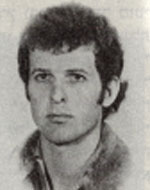Avraham, son of Hinda and David, was born on August 6, 1947 in Kibbutz Afikim, where he studied in the elementary school of the kibbutz, and in the ninth grade he began studying at Kibbutz Givat Haim. He was very interested in the humanities, and was naturally a friendly child, initiator and organizer of activities, loved to travel in Israel and was a sports fan. “The hours of recess between the classes were his big hours,” his friends said, “so there was a football game on the grass. Abrams was a wanted goalkeeper. We did not give up on him, because he was not a good and quick goalkeeper in the entire area. “He later became interested in basketball and water-ball and joined the Givat Hayim water polo team, he was tall and sturdy, very Simcha, very active and loved by his friends. Avraham was drafted into the IDF in mid-July 1965 and volunteered for the Nahal Brigade, and after completing his basic training he took part in a course for squad commanders. Abraham did not particularly like the life of the army. As a man seeking independence, it was hard for him to adjust to the rigid frameworks of the army and to the strict discipline imposed on him. “A child was,” his mother said, “somewhat introverted, not accustomed to difficulties …”. During his compulsory service, he did in Shivta, Kfar Giladi and Hulata, and took every opportunity to “jump” to his parents on the kibbutz. “When he got home, the room was filled with light,” the family said. During the period of his compulsory service, the Six-Day War broke out and he took part in the fighting in Nablus. The battle was deeply engraved. “For the first time in his life, he killed an enemy soldier, he also lost one of his closest relatives, and those scars did not heal, and he carried them with him,” his friends later said. In the summer of 1968, when he was discharged, he debated whether to return to Kibbutz Afikim, where he was born and raised, or to join the Givat Haim neighborhood, where he studied and matured. “It was possible that it was Miri, Avram’s girlfriend, who influenced him to choose Givat Haim,” said his friends, who began to work in the Thanksgiving industry and invested a great deal of energy, passion and dedication in him. , For training in Indian breeding. When he joined the agriculture he immediately found a common language with people from all walks of life. He guided the young generation and participated in the editing of the pamphlet “Pamplat”, which is mainly responses to acts of injustice. At the children’s camp and in the follow-up classes he worked with great success, initiated and organized cultural activities, and the kibbutz liaison committee initiated social activities and ensured the implementation of basic principles. He devoted special attention to the future of discharged soldiers, and did not wait for them to come to him. He himself turned to the soldiers who came home and took care of those who walked with their “nose in the ground.” In the summer of 1971, Avraham married his childhood friend, Miri, nee Yagoda, and in February 1971 their eldest daughter, Neta, was born. Abraham was a model husband and a loving father. The afternoons and evenings were his best hours. Then the house was full of friends, music, wonderful four-day meals and trips with Little Neta. At the end of June 1973 the family grew up when Sivan was born. Abraham’s life was full of plans, and all dreams and hopes were abruptly cut off. At noon on Yom Kippur Avraham was called to his unit in the Armored Corps, and sent to the southern front. He fought as a noncom in the unit that operated the amphibious vehicles and together with his friends crossed the water line to the western side of the Suez Canal. On the 19th of Tishrei 5734 (19.10.1973) Avraham was killed in battle for the village of Sirafum. His comrades-in-arms tell him that he helped the combat medic treat the wounded soldier. While fighting for the life of his wounded friend, he was killed by a shell fired by the Egyptians. He was brought to eternal rest in the cemeteryIn Givat Haim. He left behind a wife and two daughters, parents and four sisters. After his fall, he was promoted to First Sergeant. In a letter of condolence to the bereaved family, the unit commander wrote: “Your son, Avraham, served in an armored unit and integrated into the unit in the best possible manner, while demonstrating his good and comfortable character.” A pamphlet published in memory of the fallen includes remarks by friends and acquaintances in the Givat Hayim farm about his character and his path, as well as excerpts from his letters.
